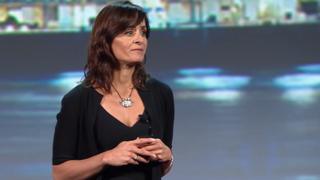 Image copyright
Image copyright
RSA
Howe travelled to the US on her own as an 11-year-old after the Iranian revolution
Niloofar Howe is a rare woman working in internet security.
Her path to being the chief strategy officer of internet security firm RSA started when she travelled on her own to the US at 11-years-old.
Ms Howe remembers vividly arriving at San Francisco airport on her own.
“A tall, lanky, moustached immigration agent spends what feels like an eternity questioning me. I know the stakes are high. I know my family’s future depends on me passing this interview” she explained at a Tedx event.
Her family had fled Iran shortly before the 1979 revolution.
They went to the UK and a few months later put her on a flight to the US as they “calculated that an 11-year-old girl on her own will not be turned away by immigration,” she said.
Their calculation paid off.
The customs officer stamped her Iranian passport and she started her new life.
The first thing she had to do was adapt to California – a place she described as “where all-you-can eat buffets and free-thinking rebellion are the norm”.
She found her safe space in coding.
“I was happy in the computer room,” she told the BBC.
“I was an immigrant, trying to fit in a girls’ school and the computer room was a safe place to be.”
Sidetracked by Spielberg
But at 17-years-old she took an entirely different direction.
She “fudged” a few details on her CV and applied for a job as a casting assistant for Steven Spielberg.
“My 1968 birthday changed to 1966 so I could work legally full-time in that job,” she explained.
“I remember trying to stay as close to the truth as possible.”
Ms Howe was in her senior year at school, but was also doing a course at the University of California in Los Angeles (UCLA) so just didn’t mention the bit about school.
She had also been an assistant director in theatre productions and gave that a prominent showing in her CV.
She got the job and for around eight months she moonlighted between casting for a TV show and her senior year at high school.
The UCLA course gave her more freedom than in normal high school and when she needed to take an exam she told her boss that she had a doctor’s appointment.
It would be decades before she returned to the world of coding.
In that time she went from being an entertainment lawyer to business consultant to angel investor to venture capitalist.
Image copyright
Mack Staples Sr
Ms Howe says women should be attracted to a career protecting people
Ms Howe was meeting with the cyber security company Endgame to talk about investing in them when she was offered a job by the chief executive.
“He said ‘raising money is not going to be a problem. What I need is a business partner’.”
She took the job of chief strategic officer and eventually moved to a bigger cyber security company RSA.
She described the path back to the computer room as “circular” and said she had been “distracted” by “bright shiny things” in the entertainment industry.
But Ms Howe said she was not alone, as a female, in her interest in technology not turning into a career at first.
Over the nine years of investing in tech, she said she had only met a “handful” of female company founders.
Protective urge
But Ms Howe urged women to consider working in internet security specifically.
She said making the internet safe was a “mission” that “appeals to women”.
“Solving a problem that makes the world safer, makes our personal lives safer and makes our children online safer,” is how she put it.
Internet security companies are struggling to fill vacancies and she said the demand for workers was only going to become bigger.
The 13-year-old in the computer room now needs many more protections than when she was a teenager.
My journey from fleeing Iran to making the internet safer

